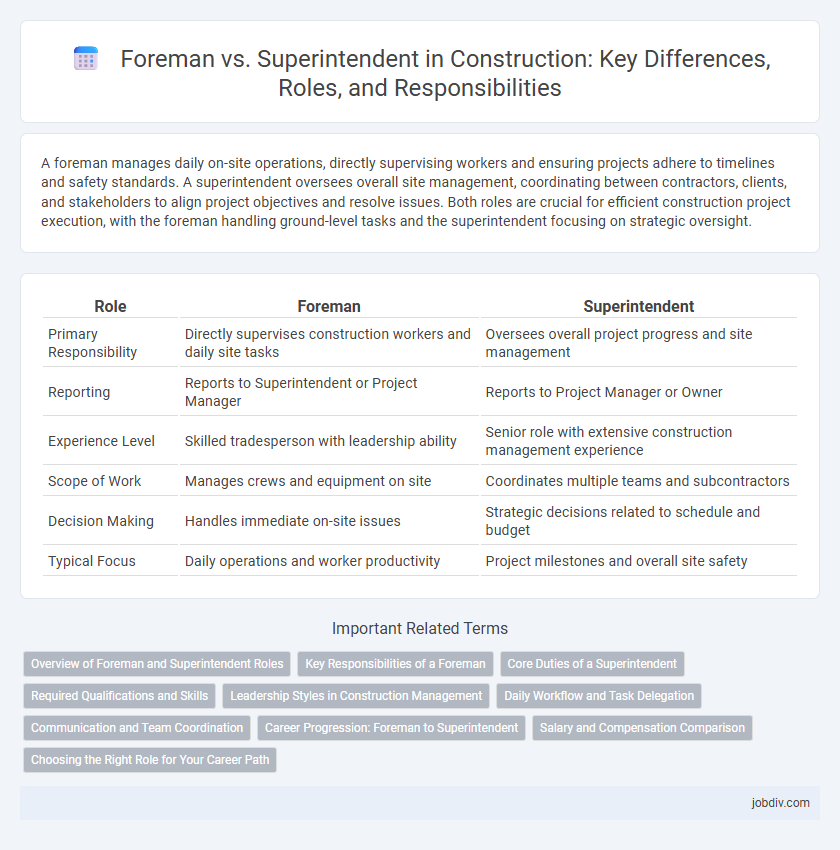A foreman manages daily on-site operations, directly supervising workers and ensuring projects adhere to timelines and safety standards. A superintendent oversees overall site management, coordinating between contractors, clients, and stakeholders to align project objectives and resolve issues. Both roles are crucial for efficient construction project execution, with the foreman handling ground-level tasks and the superintendent focusing on strategic oversight.
Table of Comparison
| Role | Foreman | Superintendent |
|---|---|---|
| Primary Responsibility | Directly supervises construction workers and daily site tasks | Oversees overall project progress and site management |
| Reporting | Reports to Superintendent or Project Manager | Reports to Project Manager or Owner |
| Experience Level | Skilled tradesperson with leadership ability | Senior role with extensive construction management experience |
| Scope of Work | Manages crews and equipment on site | Coordinates multiple teams and subcontractors |
| Decision Making | Handles immediate on-site issues | Strategic decisions related to schedule and budget |
| Typical Focus | Daily operations and worker productivity | Project milestones and overall site safety |
Overview of Foreman and Superintendent Roles
Foremen oversee daily construction activities, directly managing crews and ensuring tasks align with project specifications and safety standards. Superintendents hold broader responsibilities, including overall site coordination, scheduling, and communication between subcontractors, clients, and management teams. Both roles are essential for project efficiency, but superintendents focus on strategic oversight, while foremen manage on-the-ground operations.
Key Responsibilities of a Foreman
A Foreman in construction oversees daily site operations, ensures worker safety compliance, and coordinates tasks among subcontractors to maintain project schedules. They directly supervise labor crews, enforce quality control standards, and communicate progress reports to superintendents. Foremen play a critical role in resource allocation, equipment management, and resolving on-site issues to optimize workflow efficiency.
Core Duties of a Superintendent
A Superintendent oversees the entire construction project, coordinating schedules, managing subcontractors, and ensuring compliance with safety regulations and quality standards. They act as the primary liaison between project owners, architects, and contractors, maintaining budget control and resolving on-site issues promptly. Their core duties also include monitoring progress, conducting site inspections, and ensuring the project adheres to timelines and contractual requirements.
Required Qualifications and Skills
A Construction Foreman requires practical experience in supervising crews, strong communication skills, and knowledge of safety regulations to manage day-to-day site operations effectively. In contrast, a Construction Superintendent demands advanced project management skills, expertise in budgeting and scheduling, and the ability to coordinate between multiple stakeholders to ensure project completion on time and within scope. Both roles benefit from certifications such as OSHA safety training, but the Superintendent often necessitates a bachelor's degree in construction management or engineering.
Leadership Styles in Construction Management
Foremen in construction typically employ hands-on leadership, directly supervising crews and ensuring tasks align with project specifications, fostering immediate problem-solving on site. Superintendents adopt strategic leadership, managing multiple project facets including scheduling, safety compliance, and stakeholder communication to drive overall project success. The foreman's focus on operational leadership contrasts with the superintendent's broader, administrative leadership role within construction management.
Daily Workflow and Task Delegation
Foremen oversee on-site daily operations, directly managing crews and ensuring tasks align with project schedules, while superintendents coordinate multiple foremen and broader project activities, focusing on resource allocation and compliance with safety regulations. Foremen handle immediate task assignments and quality checks, delegating specific responsibilities to tradespeople, whereas superintendents prioritize overall workflow efficiency, subcontractor coordination, and progress tracking. Effective collaboration between foremen and superintendents streamlines construction timelines and ensures adherence to project milestones.
Communication and Team Coordination
Foremen serve as the primary communication link between workers and management, ensuring daily tasks are clearly understood and executed with precision. Superintendents oversee broader project coordination, aligning multiple teams while communicating progress and challenges to stakeholders for efficient workflow. Effective communication and cohesive team coordination between foremen and superintendents are essential for maintaining project timelines and safety standards on construction sites.
Career Progression: Foreman to Superintendent
Career progression from Foreman to Superintendent in construction involves advancing from overseeing daily crew tasks to managing entire project operations and coordination. Foremen develop essential leadership, scheduling, and problem-solving skills that form the foundation for Superintendent responsibilities, which include budgeting, safety compliance, and stakeholder communication. Gaining experience in project management software and obtaining certifications such as OSHA or PMP often accelerates the transition from Foreman to Superintendent.
Salary and Compensation Comparison
Foremen in construction typically earn between $50,000 and $75,000 annually, reflecting their hands-on supervisory role on-site. Superintendents command higher salaries, ranging from $80,000 to $120,000, due to their broader responsibilities overseeing multiple projects and teams. Compensation packages for superintendents often include bonuses, profit sharing, and additional benefits, which significantly increase their total earnings compared to foremen.
Choosing the Right Role for Your Career Path
Foremen typically oversee day-to-day labor and task execution on construction sites, ensuring crew productivity and safety standards are met, while superintendents manage overall project coordination, timelines, budgets, and communication among stakeholders. Selecting the right role depends on your strength in hands-on leadership versus strategic project management, with foreman roles suited for those who excel in direct crew supervision and superintendent positions ideal for those focused on high-level planning and problem-solving. Career advancement often involves transitioning from foreman to superintendent, leveraging field experience to manage larger scopes and complex project demands.
Foreman vs Superintendent Infographic

 jobdiv.com
jobdiv.com